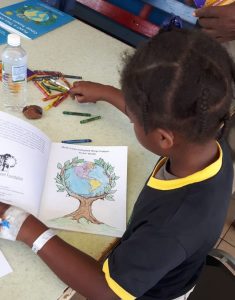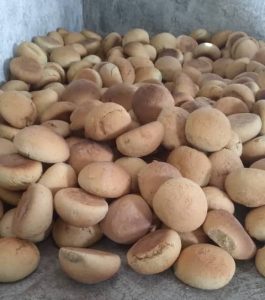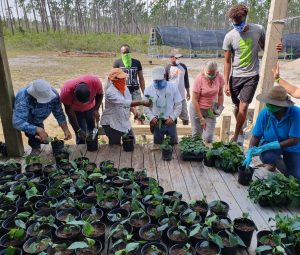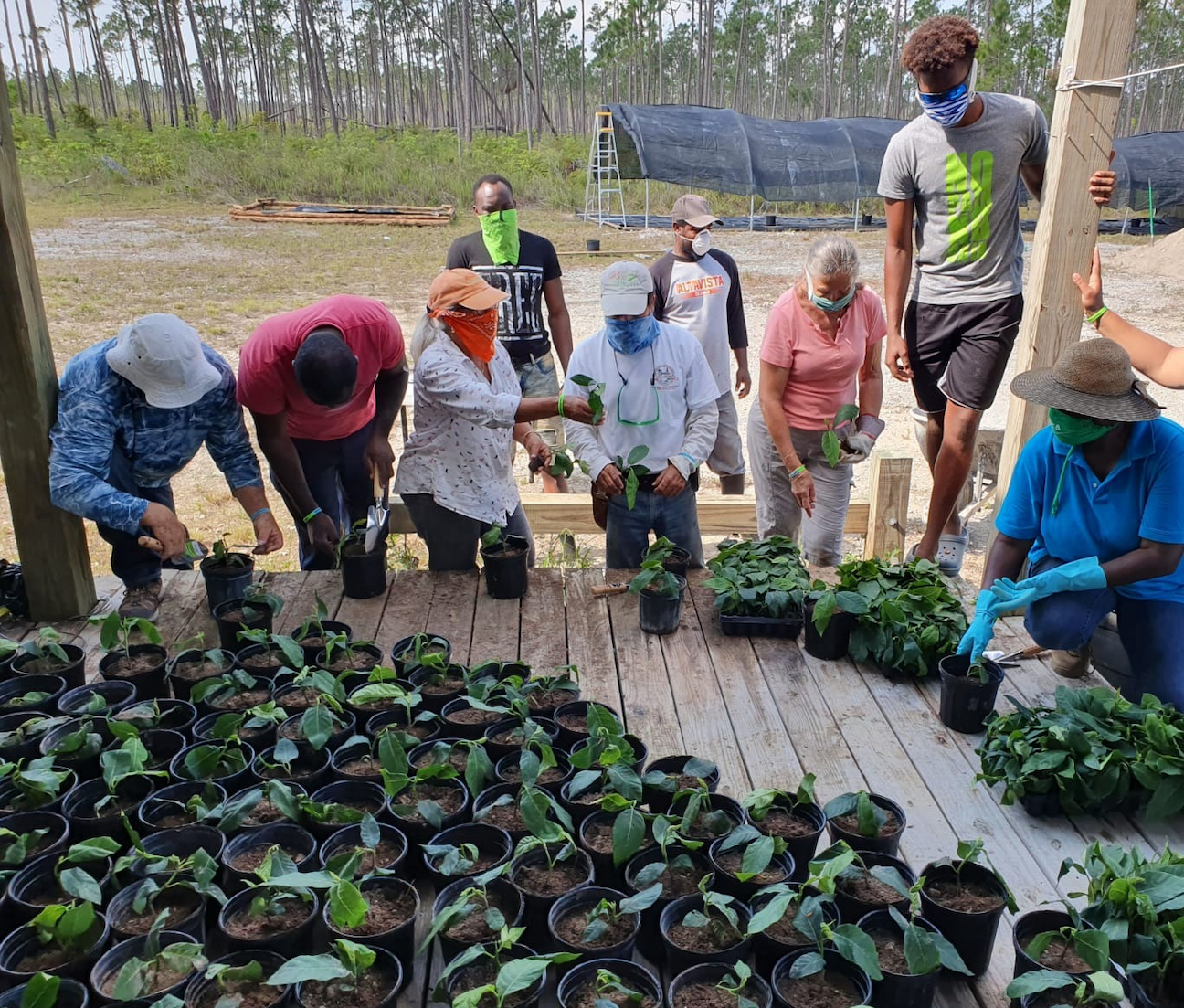By Natasha Norris, Communications and Program Manager, Trees that Feed Foundation
When like-minded people join forces, the impossible becomes possible.
One Rotarian’s search for a solution to climate change has now impacted thousands of lives in the Caribbean and beyond with bonuses galore. Cathy Henry of the Rotary Club of St. Catharine’s South, Ontario, Canada, found her answer when she met Mary and Mike McLaughlin, co-founders of Trees that Feed Foundation (TTFF). Based near Chicago, Illinois, TTFF plants fruit trees – mainly breadfruit – to feed people, create jobs, and benefit the environment in 20 countries.
Why breadfruit? It’s climate resilient! Once established, the tree can survive harsh circumstances and live for 80-100 years. While other staples like rice fill our atmosphere with greenhouse gases, a breadfruit tree captures carbon dioxide (approximately 1.3 tons in its lifetime) in the air while also supporting soil carbon sequestration. Versatile and nutrient rich, it can be processed into flour and thus creates an economic value chain within a community.
How do Rotary and TTFF collaborate? It’s a symbiotic relationship. Some Rotary clubs donate their time, planting trees funded by TTFF. Some Rotary clubs fund the trees. The more they work together, the more NGOs, governments, and individuals come alongside them.Everyone witnesses the results, especially when looking back over the years – or up at a flourishing breadfruit tree!
Here is how Rotarians are working with TTFF to advance food security, rebuild soils, and capture carbon across the Caribbean and beyond.
Jamaica THEN: More than a decade ago, Rotary launched into action with TTFF. The duo’s first project was in Jamaica. Rotarians provided a district grant, and Rotary clubs in Canada and the U.S. traveled to Jamaica to help local clubs plant the trees in schoolyards across the island. Another partner was integral, as well: the Ministry of Education.
Rotarians funded a hybrid solar dehydrator, designed by TTFF, for one school in Jamaica to preserve fruit long-term and turn breadfruit into flour for food and income. This piece of equipment is used in other countries, such as Haiti. Rotary also helped TTFF introduce their educational activity book, Plant a Tree and Good Things Happen, to schools in Jamaica.
Jamaica NOW: The trees are fruiting profusely. A local NGO makes flour, and a baker makes breadfruit bullas from some of that fruit. TTFF donates the bullas, nutritious biscuits hearty enough for a meal, to the schools. Children love them! Besides feeding children, the trees also provide ample shade, soil retention, better air and groundwater quality, and wildlife habitat.

A Jamaican child enjoying TTFF’s children’s book on the multiple benefits of trees for food and ecosystem restoration.
Thousands of the schoolbooks are now distributed by the Forestry Department across Jamaica. The book, paired with the living proof in the schoolyard, teaches students the value of fruit trees to the environment and their community. That encourages them to plant more throughout their lives.
Translated into nine languages, the book also supports literacy. It is 40 pages long and comes with a teacher’s manual. Our planet’s future depends on our children. The adults in their lives are learning the important lessons of the book too when a child brings one home. TTFF also holds training sessions for farmers and entrepreneurs.
Haiti THEN: Rotary and TTFF expanded their work together across the Caribbean. More and more clubs joined the breadfruit tree planting union. In countries struggling as much as Haiti, even a modest effort reaps monumental impact. The Rotary Club in Rochelle, Illinois, went far beyond that, providing powerful support to the Haiti project and even couriering saplings into the country.
Haiti is plagued with political unrest, gang violence, poor infrastructure, and disease. Haitian farmers are also faced with natural disasters and drought, nutrient depleted and eroded soil, and a mountainous terrain. Because breadfruit trees are grown and flour is made within a community – and because nearly all ingredients of the products can be sourced locally, the TTFF model overcomes many challenges of providing sustainable food in Haiti.

Breadfruit konparets in Haiti
Haiti NOW: The Rotary Club of Calgary (Canada) at Stampede Park purchases 300 breadfruit per month from an entrepreneur mentored by TTFF named Pierre-Moise Louis. In his nursery, he grows the trees and hardens them for distribution. In his bakery, he produces breadfruit flour and konparets (pictured here), which the partners donate to schools. Pierre-Moise and others train women to make and sell the konparets. He teaches farmers the best practices for tree planting and care. And he tracks every tree, which you can see on the Tree Tracker world map.
Bahamas THEN: In 2019, Hurricane Dorian struck the Bahamas and ravaged the islands for 48 hours. Flooding and mass destruction left people homeless, jobless, and without most of their trees. Almost all the farmers in the affected areas lost their livelihoods.
The Rotary Club of Niagara Falls Sunrise put out a request for disaster relief to the Rotary Club of St. Catharine’s South, Cathy Henry’s club. A chain of global Rotary connections led to the Rotary Club of Abaco, who jumped in. TTFF brought the Ministry of Agriculture on board, and soon farms were being rebuilt with breadfruit trees.

Volunteers repotting breadfruit saplings sent to the Bahamas after Hurricane Dorian
Bahamas NOW: Breadfruit abounds! TTFF has completed its seventh shipment into the Bahamas and is working on number eight. Rotary volunteers continue to play an important role in the program. Other partners have joined in the mission, including the First Lady of the Bahamas, a Member of Parliament, National Tropical Botanical Garden and other individuals and NGOs.
Beyond the Caribbean THEN: The Rotary/TTFF collaboration shot around the globe when Pakistan became a focus for the Rotary Club of St. Catherine’s South. It was the first ever breadfruit initiative in the country. The District Governor of Karachi and local Rotary clubs assisted with distributing hundreds of these trees, which would bear a “superfood.”
Beyond the Caribbean NOW: In Uganda, TTFF has invited local Rotary clubs to be part of a brand-new tree- planting consortium. The goal is to encourage Ugandans to integrate breadfruit into their lives. TTFF has created a country-specific brochure to educate them about the benefits. Of course, the best way to realize the value of this special tree is to have one in your backyard! The consortium already has tree requests from Ugandans, and it is in the initial phase of preparing for distribution.
The future is bright for beneficiaries of the dedicated efforts of Rotary and TTFF. We see that students are healthy, happy, and able to learn on a full stomach. We see that the children are becoming more environmentally minded. We see that farmers, entrepreneurs, and whole communities are thriving economically.
Environmental effects are less tangible. However, studies have proven that one of the best ways a community – or an entire country – can adapt to climate change is by planting breadfruit trees!
As has become crystal clear, collaboration increases impact exponentially.
Visit the TTFF website to learn more. To get involved, email me at Trees That Feed Foundation or Rotarian Cathy Henry.

